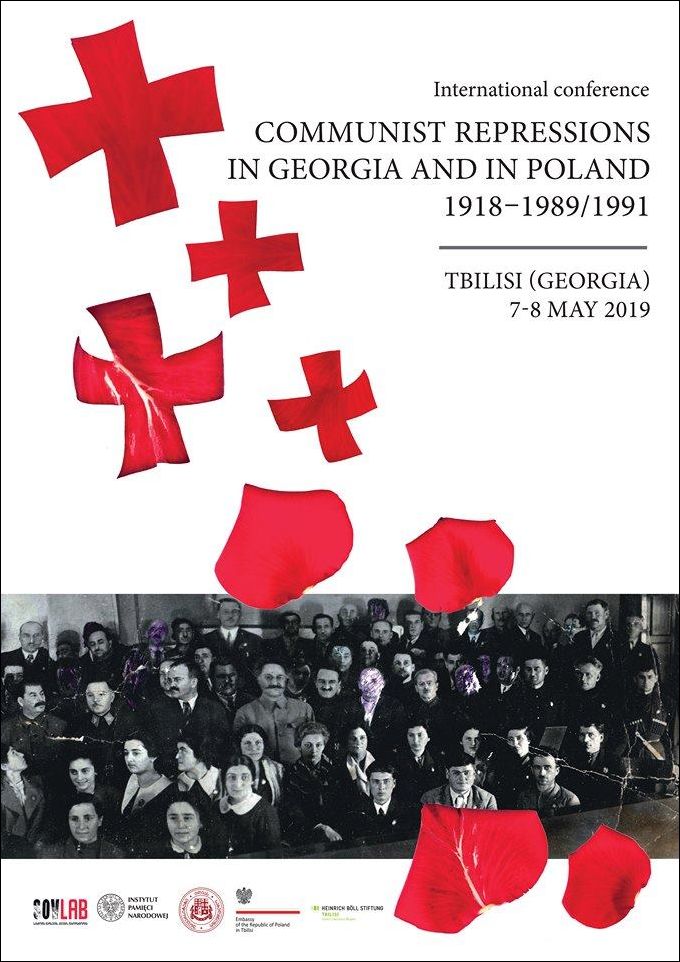PROGRAMME
7 May 2019
10.00 – opening of the Conference
10.15–12.15: Communist repressions in 1918–1945, (part I)
-
Prof. Otar Janelidze (National Museum of Georgia, Gori State University) – The Soviet politcal repressions in Georgia – victims and perpetrators.
-
Prof. Mikheil Bakhtadze (Ivane Javakhishvili Tbilisi State University) – The fate of the Military elite of Georgian democratic republic in 1920–1930 the years of Soviet terror.
-
Prof. Malkhaz Matsaberidze (Ivane Javakhishvili Tbilisi State University) – The Speech of lavrenty beria “For the History of the bolshevik organizations of Transcaucasia” as a Historical and Theoretical Justification of the Necessity of Repressions.
-
Lech Kończak (Polish Institute in Tbilisi) – Repressions against Georgian writers and artists in the 1930s.
12.15–12.30: coffee break
12.30–14.30: Communist repressions in 1918–1945, (part II) -
David Jishkariani (Soviet Past Research laboratory) – Purges and trials of NKVd officers as “violators of Socialistic justice”.
-
Irakli Khvadagiani (Soviet Past Research laboratory) – Destroying the Georgian old bolsheviks society in 1936–1938; analyses of the cluster of victims.
-
Dr. Timothy Blauvelt (Ilia State University) – Terror and Soviet Patronage: the Case of abkhazia
-
Dr Bartłomiej Bydoń (Katyn Museum in Warsaw) – Polish officers murdered in Katyn
-
Dr hab. Georges Mamoulia (eHeSS) – Soviet repression against activists of the Promethean movement (1926–1945)
14.30–14.45: coffee break
14.45–16.30: Communist repressions in 1945–1989/1991, (part I) -
Dr Dariusz Rogut (Institute of National Remembrance in Łódź, Łódź/ The War Studies University in Warsaw) – Poles repressed by the Soviet authorities in the control and filtration camps in the USSR in the years 1945–1947.
-
Marian Stephania (Kutaisi Historical Museum) – Soviet labor camps in Georgia.
-
Paweł Sztama, (Institute of National Remembrance/Maria Curie Skłodowska University in lublin) – Ministry of Public Security of the People’s Republic of Poland as a tool of repression in 1944–1954.
-
Prof. Tadeusz Wolsza (The Tadeusz Manteuffel Institute of History Polish academy of Sciences/ Casimir the Great University in bydgoszcz) – Penitentiary system of the People’s Republic of Poland 1945–1956.
8 May 2019
10.00–12.00: Communist repressions in 1945–1989/1991, (part II)
-
Vano Jahua, (archive of MIa of Georgia) – The security institutions of the Soviet Georgia 1921–1991.
-
Vakhtang Kekoshvili (Ilia State University) – Criminal sub-culture and Totalitarian state in Soviet Georgia.
-
Dr Paweł Libera (Institute of National Remembrance/The Tadeusz Manteuffel Institute of History Polish academy of Sciences) – Operations of Polish communist and Soviet security organs against the activists of the Promethean movement and the Georgian emigration in Poland after 1945.
-
Prof. Filip Musiał (Institute of National Remembrance/Jesuit University Ignatianum in Kraków) – Anti-communist underground in communist Poland after 1945.
12.00–12.15: coffee break
12.15–14.00: Social and cultural consequences of the communist period, (part I) -
Prof. Danuta Jastrzębska-Golonka, (Casimir the Great University in bydgoszcz) – The language of the security service in Communist Poland 1945–1956.
-
Tamar Kintsurashvili (Ilia State University) – “Hate speech” – the language of totalitarianism and terror in Soviet Georgia.
-
Dr Magorzata Misiak (University of Wrocław) – The language of the security service in Communist Poland 1956–1989.
14.00–14.15: coffee break
14.15–16.15: Social and cultural consequences of the communist period, (part II) -
Dr. Darejan Javakhishvili (Ilia State University) – Psychological legacy of Soviet terror in Georgian society.
-
Prof. Tengiz Simashvili (Telavi State University) – “Gigos Gora” Mass graves of victims of Soviet terror in Telavi - remembrance and identification.
-
Prof. Włodzimierz Suleja (Institute of National Remembrance/ University of Wrocław) – The shadow of the communist past – the Polish perspective.
-
Dr. David Darchiasvili (Ilia State University) – The influence of Soviet past on post-Soviet political practice in Georgia.
16.15–17.00: discussion
